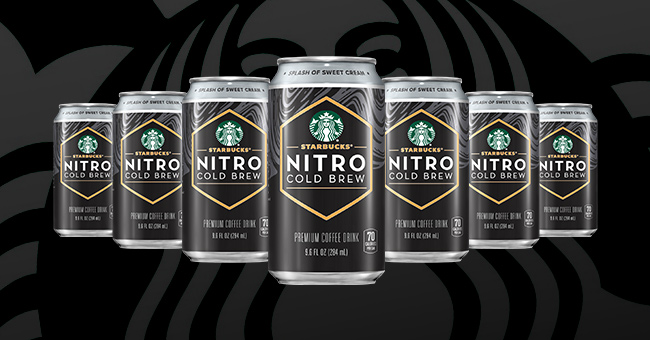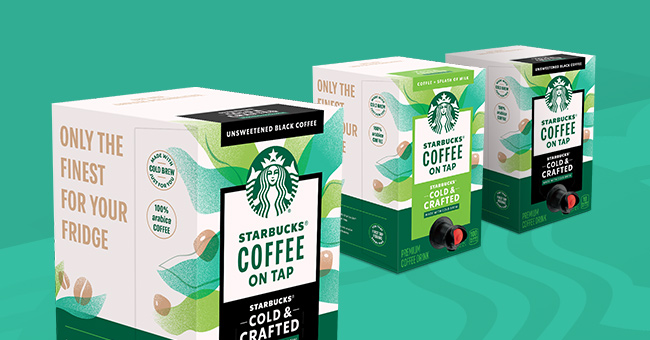Ready-to-drink coffee category leader Starbucks has formally unveiled its lineup of new product releases for 2022, which sees the brand entering the natural energy space and launching its first coffee drinks with oat milk, among other innovations.
What are the new products?
Starbucks, which produces and markets RTD products in North America through a joint venture with PepsiCo, teased some of the products announced today during the National Association of Convenience Stores (NACS) trade show in October.
At the top of the list is Starbucks BAYA Energy, a three-SKU line of carbonated natural energy drinks featuring 90 calories, 22-23 grams of sugar, and 160 mg of caffeine (from coffee fruit and green coffee bean extract) per 12 oz. can. Available in Mango Guava, Raspberry Lime and Pineapple Passionfruit, each flavor contains juice concentrate and natural flavors and will retail for $2.89 per unit across channels, starting this week. The line will enter Starbucks stores starting March 1.
“We’re thrilled to introduce Starbucks BAYA Energy to our customers, providing them with a refreshing, fruit-flavored boost of feel-good energy, in a way only Starbucks can deliver,” said Chanda Beppu, vice president, Channel Development Americas at Starbucks. “Over the years, we’ve continued to identify new and exciting ways to expand our ready-to-drink portfolio and saw an opportunity to complement our existing coffee beverage lineup with Starbucks BAYA Energy, the brand’s first beverage to launch in the energy category.”
While expanding into coffee, Starbucks is also committing to plant-based innovation within its core RTD coffees with the launch of its first products to feature oat milk. The first sees the brand adding two non-dairy options to its flagship Frappuccino Coffee Drinks with Caramel Waffle Cookie and Dark Chocolate Brownie, both available in single-serve 13.7 oz. glass bottles for $3.40 each. Clocking in at 55 mg of caffeine and 280 calories per unit, the new flavors will enter grocery retail first before launching online later this year. Meanwhile, Starbucks is also introducing Cold Brew with Dark Chocolate Oatmilk in 40 oz. multi-serve bottles at grocery stores this month, with a suggested retail price of $4.99 per unit.
Outside of oat milk, the coffee giant is rolling out several indulgent flavor extensions to existing lines, most notably with the addition of Nitro Cold Brew with a Splash of Sweet Cream. The SKU comes in at 70 calories, 11 grams of sugar and 110 mg of caffeine per 9.6 oz. can (MSRP $3.69). Elsewhere, Hazelnut Tiramisu is the next release in Frappuccino’s LTO Passport Series, while the 15 oz. coffee-energy play Tripleshot will feature Zero Sugar Milk Chocolate as its new flavor.
Finally, Starbucks is set to introduce its Cold & Crafted line — a single-serve cold brew drink that debuted last year — in a new multi-serve on-tap fridge pack in two varieties: Cold & Crafted Black Unsweetened and Coffee + Splash of Milk.
“Starbucks has been a leader in the ready-to-drink coffee category since 1994 and we continue to focus on beverage innovation with the highest quality coffee and ingredients,” said Beppu. “This year, we’re excited to provide customers with their favorite ready-to-drink Starbucks beverages in new flavors and formats, like Starbucks Cold & Crafted on Tap and the new Starbucks Frappuccino coffee drink with Oat-milk.”
Analysis: How does this fit with Starbucks’ strategic goals?
In terms of BAYA, the question is perhaps better framed as how it fits with PepsiCo’s larger objectives. At the company’s NACS booth, the new line was featured as one piece of a category strategy dubbed “Choose Your Energy” that featured energy products and brands tailored to four specific need states — Positive, Mellow, Bold or Focused. As the “Positive” one in that lineup, expect BAYA to lean into its better-for-you positioning (see: natural caffeine, vitamins and antioxidants for immune support) as it looks for white space in the world of natural energy drinks, populated by names like CLEAN Cause, Guayaki, Runa and a spate of others. With Rockstar exploring “relaxation energy” via CBD and MTN DEW driving traction with gamers, aligning its natural energy play under the Starbucks banner gives Pepsi’s portfolio a clear structure upon which to build.
Yet it seems notable that Starbucks has chosen traditional carbonated energy drinks as the format for its move into the a more explicitly functional beverage category, particularly as a new crop of RTD coffees — led by Super Coffee and also featuring national players like REBBL, Koia and STOK — has helped reshape the category in that mold. On that front, the introduction of Tripleshot Zero Sugar Milk Chocolate may help align that line with consumers seeking the high-caffeine, no-sugar profile that’s popular in energy right now. In terms of category fit, it’s likely to compete with products like the new nitro-infused, zero-sugar Java Monster Cold Brew, which reps at NACS described as a more premium product aimed at coffee drinkers.
As for oat milk’s arrival in the mix at Starbucks, it’s better late than never. Emerging coffee brands like RISE Brewing Co., Pop & Bottle, Minor Figures and Earth & Star have long since launched their own RTD lattes, while some of the segment’s best-known names have formed partnerships with plant-based beverage leaders like Oatly (Stumptown), Elmhurst (Bluestone Lane) and Chobani (La Colombe) for their respective products. Yet the strength of both its brand and its Pepsi-powered distribution network gives Starbucks an opportunity to convert consumers who may not yet be familiar with oat milk. And despite perhaps being a bit slow to jump on the bandwagon, Starbucks timing may be just right, with oat milk becoming the second-most popular non-dairy milk (after almond milk, already available in Frappuccino products) last year.
In any case, it’s not under any pressure to grow: The North American Coffee Partnership remains the RTD coffee category leader by some distance, and dollar sales are up 10% year-over-year through January 15, 2022, according to Nielsen data.



